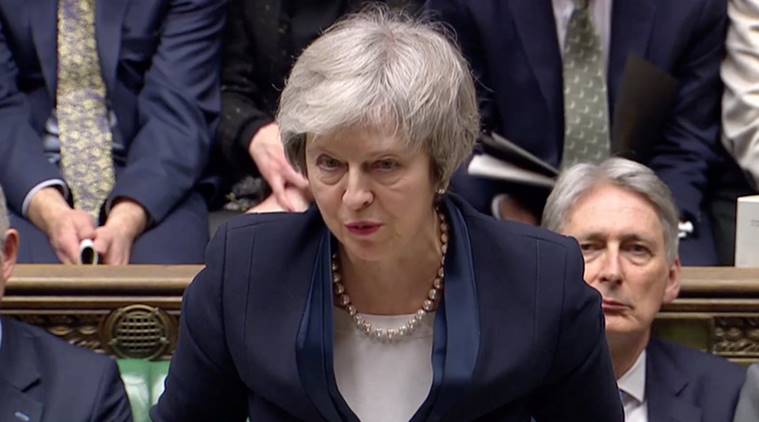
Written by Atul Mishra
The events that took place in the UK parliament on January 15 and 16 were the latest in the Brexit chaos that nears its end as the hard deadline for exiting the European Union — March 29 — approaches. If a formal deal with the EU were to be reached, which seems difficult given the odds, the divorce will be an orderly one. If no deal takes place, the separation will happen regardless, but it would be followed by a mass of confusion and considerable headache for the UK government.
After the British people voted on June 23, 2016 by a slim majority to exit the EU, then Prime Minister David Cameron of the Conservative Party resigned his office as well as party leadership. The Conservatives elected Theresa May as their new leader and she became prime minister. On May then fell the arduous task of initiating the Brexit process and negotiating a deal with the EU. As negotiations proceeded, in April 2017, May called for a snap general election believing that she will get a fresh mandate, which would strengthen her position in EU negotiations.
The move was a disaster. She lost majority in parliament, the Labour Party under Jeremy Corbyn made considerable gains and May had to find a coalition partner, the Democratic Unionist Party, to run her minority government. The election outcome weakened her hand rather than strengthening it.
This also gave advantage to the EU leadership, who have naturally wanted to punish the UK, not least because it helps them undercut doubts regarding the strength and desirability of their supranational project. But it also opened fissiparous tendencies within the Conservative Party, with MPs rebelling, challenging May’s leadership and publicly dissociating themselves from the May-led Brexit process. Besieged, May negotiated a 585-page withdrawal agreement — the Brexit Deal — and sought its parliamentary ratification.
On voting day, January 15, May volunteered to face a no-confidence motion against her government if the deal was rejected. It was. By an epic margin of 230, the biggest defeat of a government policy since 1924. Many Conservative MPs voted against their own prime minister’s plan. Next, Corbyn introduced the no-confidence motion, which was voted down on January 16. This time, the Conservatives voted to save their government. The outcome: A much humiliated and weakened May left to ensure an exit that will not be disgraceful.
So what are the lessons of this drama?
First, and facetiously, Britain can’t seem to get its exits right. On the morning after the deal was voted down, a strategist friend said it also messed up its exit from the Subcontinent in the 1940s. Add Palestine to the list. Second, but seriously, May’s success in overseeing Brexit under some kind of a deal is crucial to the ongoing struggle for acceptance of women in high politics. Only the second woman PM of Britain, May has been lampooned and abused in the media, called a “Maybot” and a “supplicant”. Her male detractors in the Tory party, such as Boris Johnson, have sought to undermine her leadership, suggesting dissatisfaction with her leadership but also betraying misogyny. She may have made political blunders, but May’s singular feature has been her grit amidst all the abuse. It is imperative, therefore, that she sees Brexit through.
Third, the drama has foregrounded the quirks and strengths of parliamentary democracy. The popular decision to exit the EU is a product of Cameron’s misjudgement. He agreed to hold the referendum hoping that the Remainers will win. It has cost two prime ministers their political careers, but each has respected the instruction in letter and spirit. MPs of the governing party have voted against their prime minister’s policy but voted for their government. They have foregrounded the fact that in a parliamentary system, legislators are supreme as they represent popular sovereignty. We would be hard-pressed to find such independence amongst Indian legislators.
Fourth, formal and informal coalition building among the ruling party, its allies and the opposition has ensured that every political group has played a role in this crucial process. This has produced delay and chaos, but it has also deepened the legitimacy of the political system. For detractors of the parliamentary system in India, this provides an opportunity to ask themselves what matters more: An executive-heavy system that could turn from stable to brittle as it loses its legitimacy; or an inclusive, though lumbering, system that keeps everyone together?
Fifth, the consequences of Britain’s exit for world politics remain unclear. Its integration into the EU project hid the process of its decline in international affairs, but it would soon be exposed again. In a different era, Britain could count on its transatlantic partner and invoke the “special friendship” they shared to gradually return to international high politics. But President Trump’s America is unpredictable, which makes the UK Foreign Office’s job more challenging.
Britain’s presence within the EU added to Europe’s heft as a liberal democratic powerhouse. Its absence will weaken the EU as an international ideological force. But Brexit will add to the strength of the inter-state relations of liberal democracies. There may be a silver lining here for the partisans of the “Indo-Pacific” democracies that seem to be ranged against an undemocratic Asian great power.